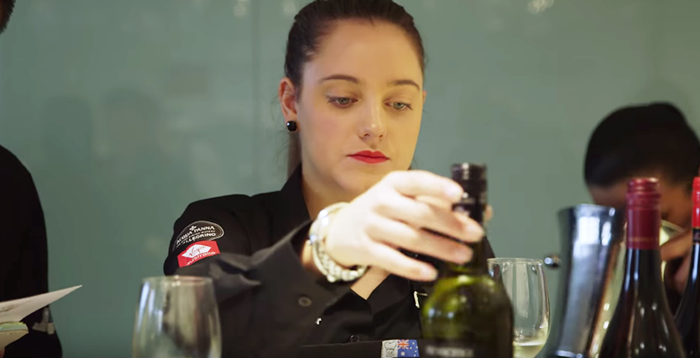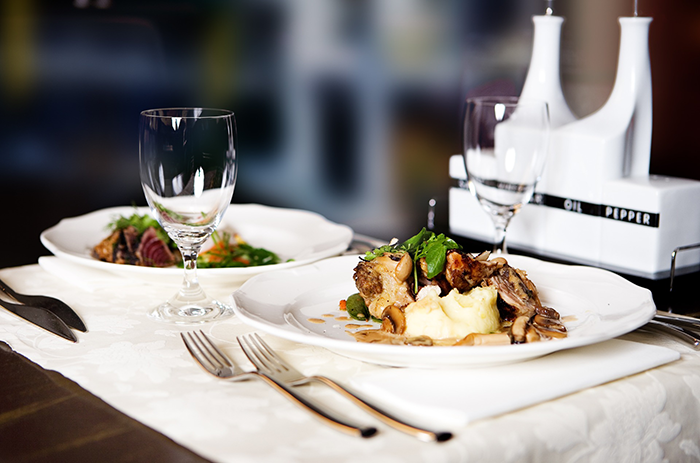Brooke Adey is a young service superstar. In 2015, she won Young Waiter of the Year at the Appetite for Excellence Awards. She is now the restaurant manager at Yellow, an acclaimed eatery in Sydney that is consistently praised for its service.
In this interview, Brooke shares some fantastic tips about reading your customers, being authentic, and learning new skills from the people around you.

Source: Appetite for Excellence
What personality traits make a good server?
For me it’s about passion and enthusiasm for the job itself. A good server is someone who really enjoys themselves, as opposed to someone who can carry five plates or recite every item on the menu, but doesn’t necessarily want to be there. Love and pride in your job are really important.
What is your number one tip for greeting customers?
Eye contact to start with, even if it’s from across the room. Let them feel like they’ve been acknowledged. And just a really friendly smile and a polite welcome to the restaurant.
As the host on the service I prefer to seat a table and get them settled, establish why they are dining with us and take their orders. This helps the other staff know that the table is seated and under control, so they can run around a bit longer like mad things if they need to.
Do you have any advice for giving menu recommendations?
Don’t make it up. If you only manage to try one dish on the menu, you’re better off selling that, because you’ll have some honesty and conviction behind you.
Don’t just make it up based on tasting notes or what the chefs have told you. You will have more success and establish a better relationship with the table if they can see that you really enjoyed that particular dish.
What are the most important cues that waiters should look out for?
I try to teach my staff that they should never judge a book by its cover. It could be the table that comes in wearing track pants that’s happy to drop a bit of money. The more you converse with them and get to know them, the easier it will be to find out why they’re there.
"I think in this industry you have to be learning constantly, and there are always so many people to learn from."
You might see people looking around the room because they want attention, or they could be looking at the architecture. You have to watch for cues so you can tell the difference.
More often than not it’s about establishing why they may be feeling a little bit hesitant in the space, or trying to reassure them that they have made the right decision, so they can sit back and relax.
How do you prioritize tables?
I find that the more guests there are on a table, the longer they can be left to wait without realizing it. It’s usually a larger group that will take a bit longer to decide on their wine or menu options.
I also consider whether a table is there for a social reason or a corporate reason. Obviously, the corporates want to get down to business, so it’s easier to help them get settled in with their wine and their food, and then step back and leave them alone for a bit.
Tables full of friends or family who haven’t seen each other for a while will spend a bit of time catching up without feeling like they’re being deserted.

Are there any common mistakes waiters make when it comes to rush hour?
Showing it in their face and eyes. The phrase 'a duck on water' is so fitting for hospitality, because you might have 20 things going on, but you have to make the customer feel like they’re the only thing on your mind.
I sometimes explain to my staff that it’s more productive to step back off the floor or out of sight for a second, gain some composure, plan your next sequence of attack, and then go back out onto the floor, instead of walking around with that look of shock and horror on your face that says you don’t know what to do next.
Are there any dining experiences you’ve had personally that have taught you something about serving?
Oh yeah, absolutely. I love dining out and I’m sure my family gets sick of me sometimes. I’m always taking notes about things that we could potentially adopt at Yellow or a future venue.
I also find it really interesting to watch the way my staff works in our restaurant. When I first started at Yellow I was green to the space and I sort of stepped straight into a management role, so it was really great to learn from them about how they explain a dish or interact with regulars in the restaurant. I think in this industry you have to be learning constantly, and there are always so many people to learn from.
What made you decide to enter Appetite for Excellence?
I entered for the first time in 2014. A chef I’d worked with years back in Adelaide had entered Young Chef of the Year before and won it, so he was a fantastic ambassador for the program. I had an opportunity to talk to him and he basically said just do it. It doesn’t matter what happens or how far you go with it, you meet great people and it’s a really eye-opening experience.
I couldn’t agree with him more. Even in the written application process when you’re forced to sit down and work out your career goals, what your service philosophy is, how you would act in certain situations, I found it great to step back and work out what I wanted to get out of the industry.
"Love and pride in your job are really important."
I was slightly guilty for a while there of having small town syndrome, coming from Adelaide. I was like, yeah, we’re good, but we’re no Sydney or Melbourne. It was really interesting to go to the state finals and realize that we do have the talent as well. I made some lifelong friends through that process and that’s how I moved to Sydney. Nick Hildebrandt, who was one of the judges in 2014, said that if I was ever thinking about a move there would be a job for me at Bentley, and that led me to where I am today.
I came runner-up that year and then I decided to go at it again. Not necessarily because I thought I could better myself, but because I wanted to prove to myself that I’d learnt a lot in the 12 months. I certainly felt a lot more confident when I went through the process again.
Do you have any advice for people thinking about entering the competition this year?
Don’t hesitate, just do it. I would say prep your application form ahead of time and then keep going back to it. Speak to people in the industry as well. Ask them for advice. And just go in and have fun with it.
Even if you don’t make it through to national finals, there are some really amazing people and some really amazing opportunities that can come out of the program.
If you're a young waiter, chef or restaurateur in Australia, you can enter the 2016 Electrolux Appetite for Excellence Awards until Thursday March 31. Check out the website for more details.
You can follow Brooke Adey on Twitter @brookeadey.